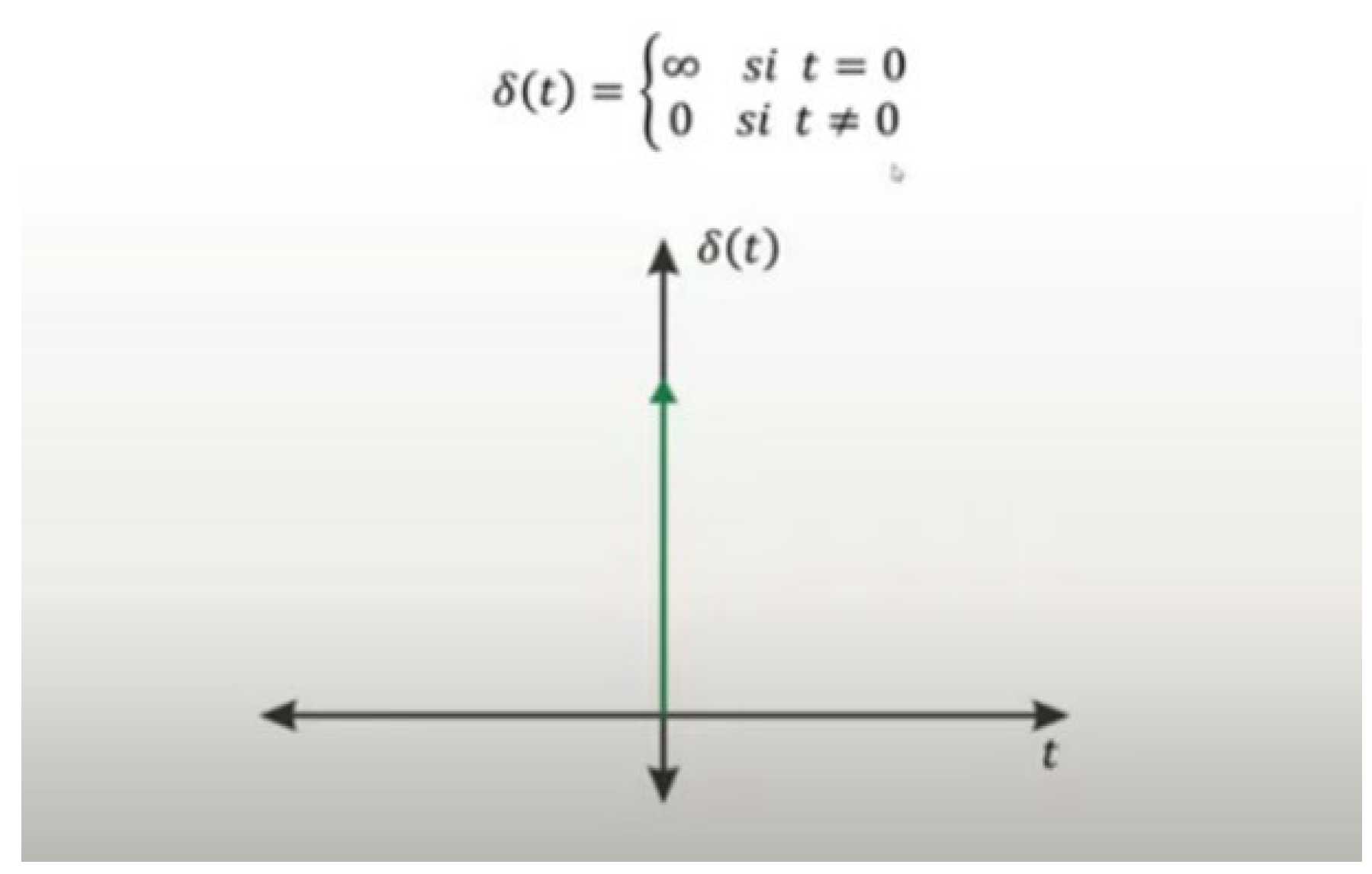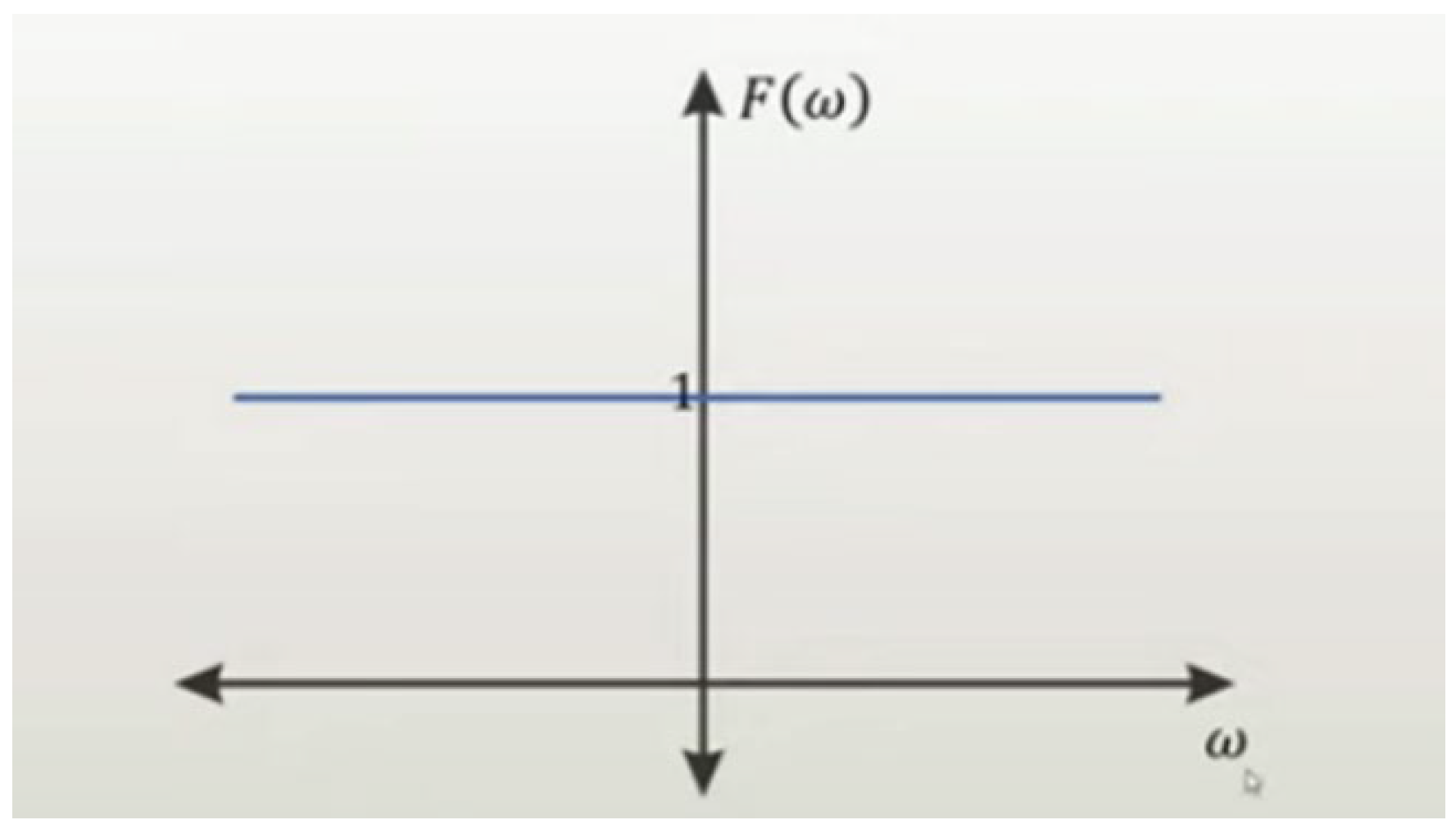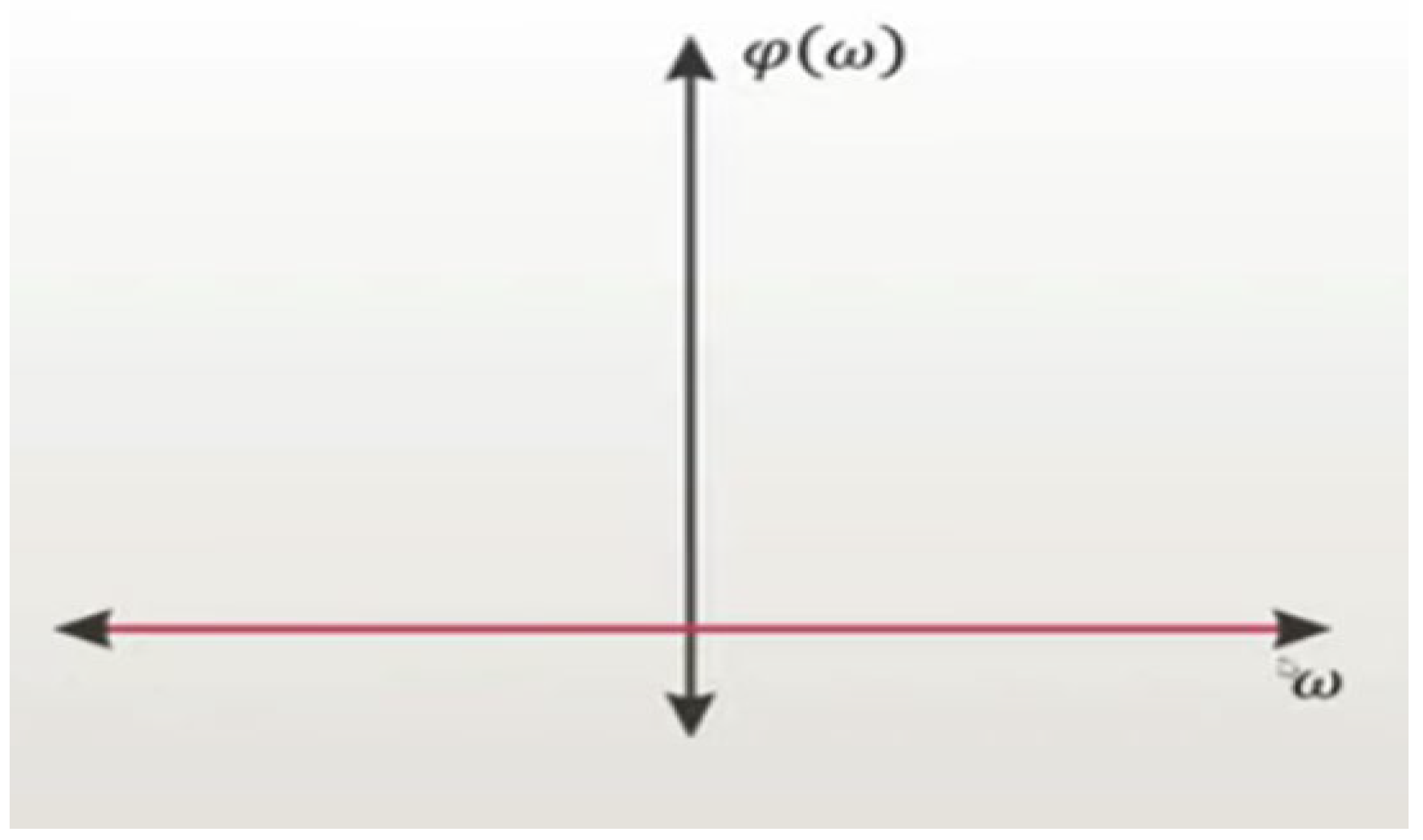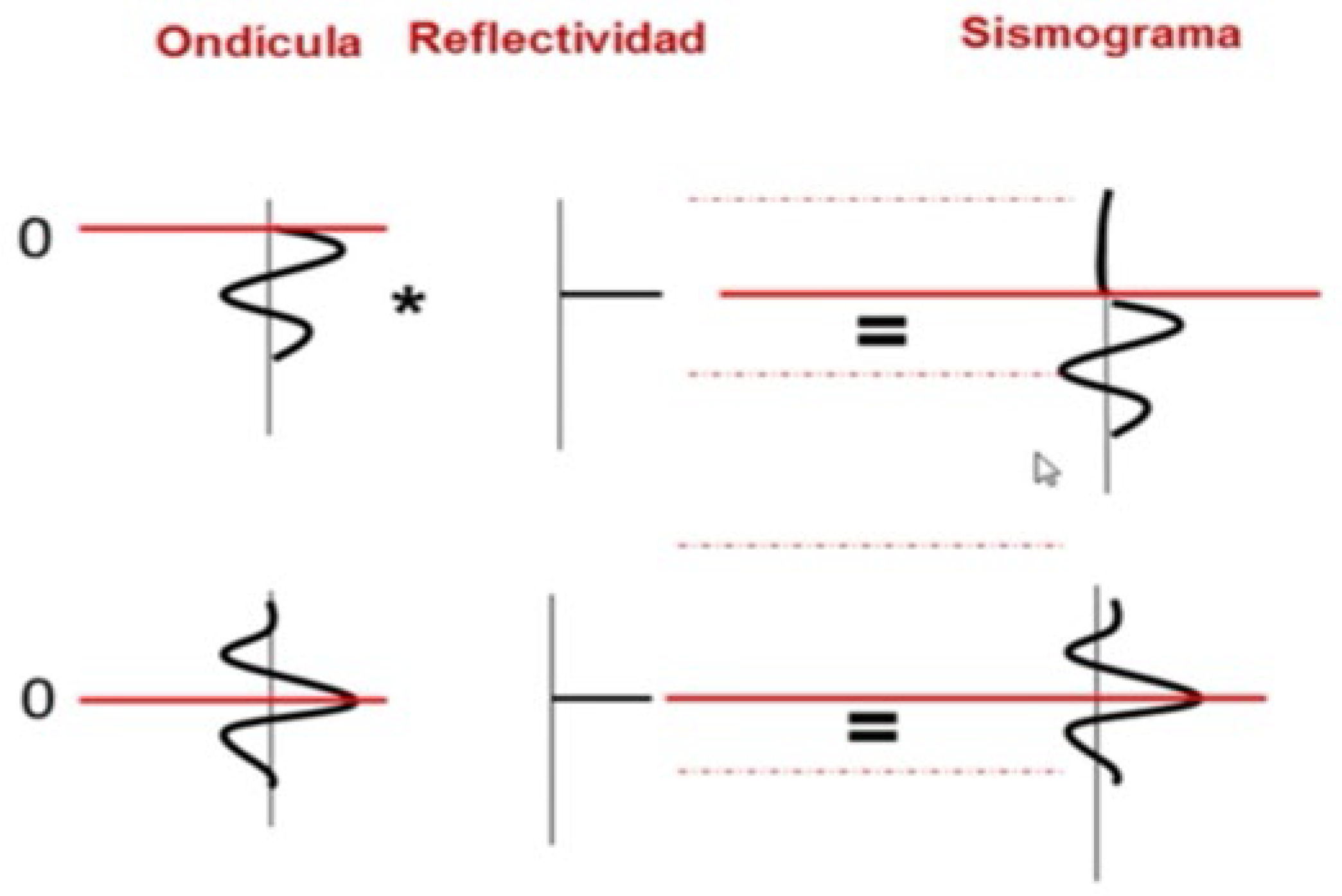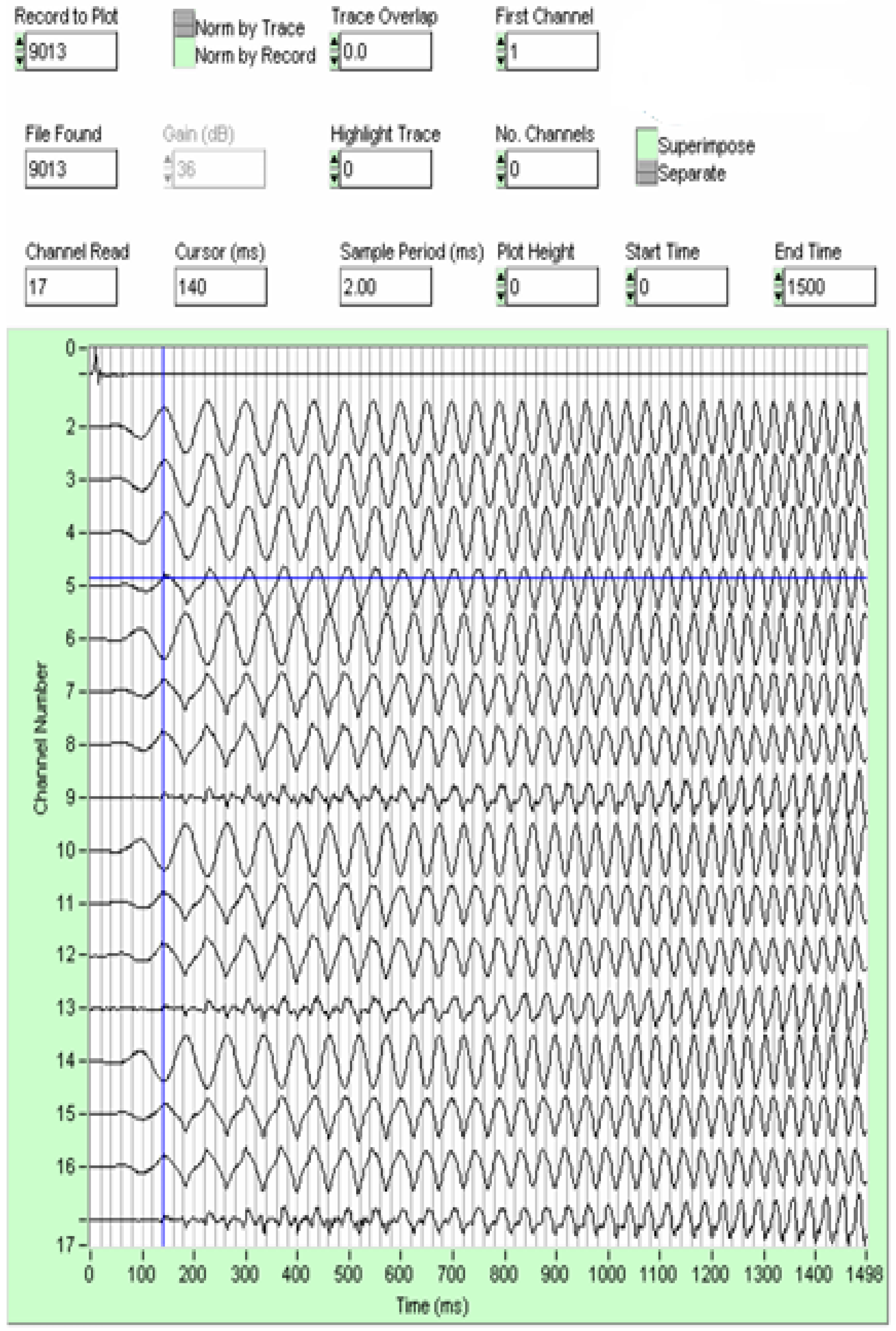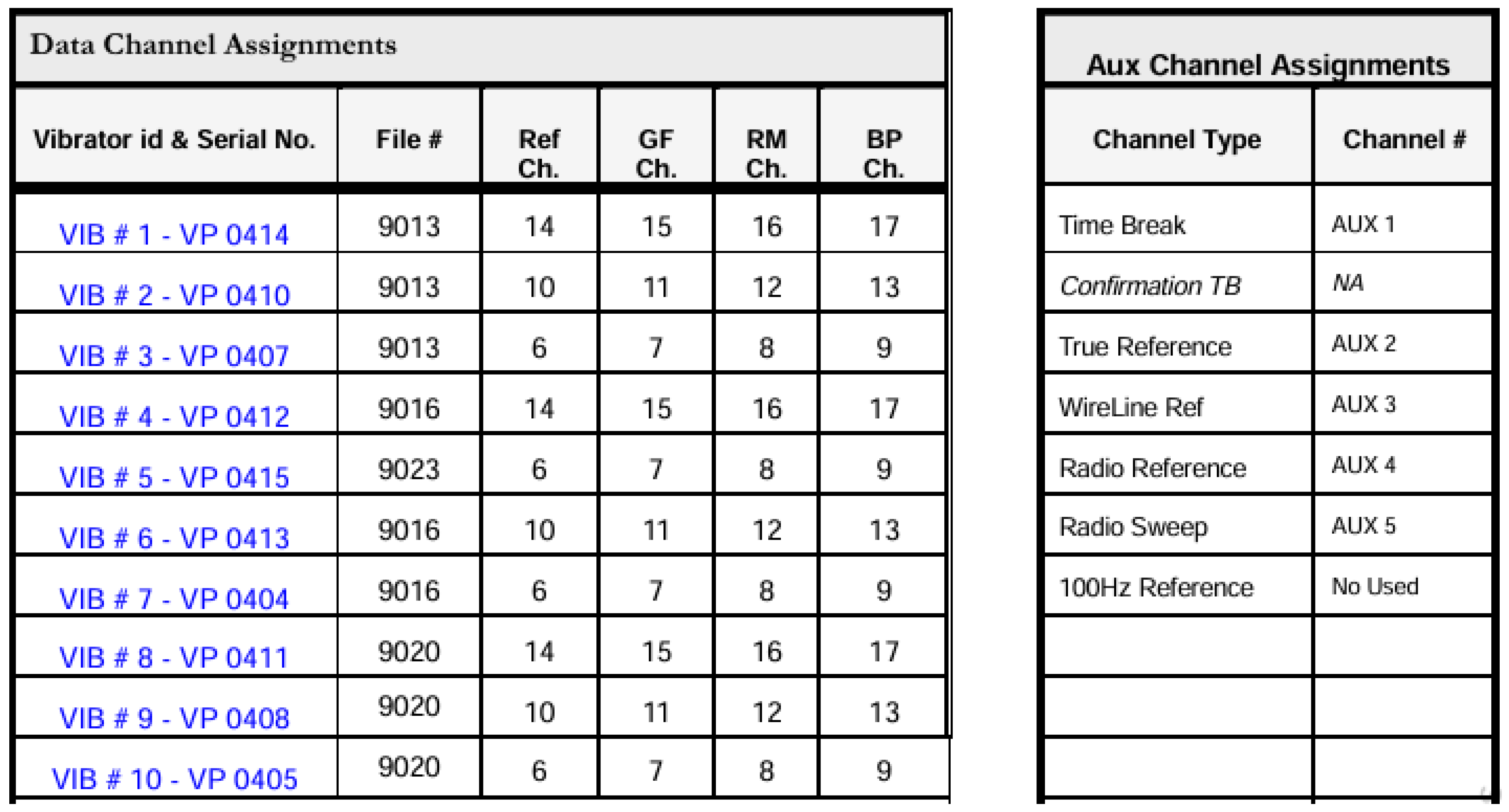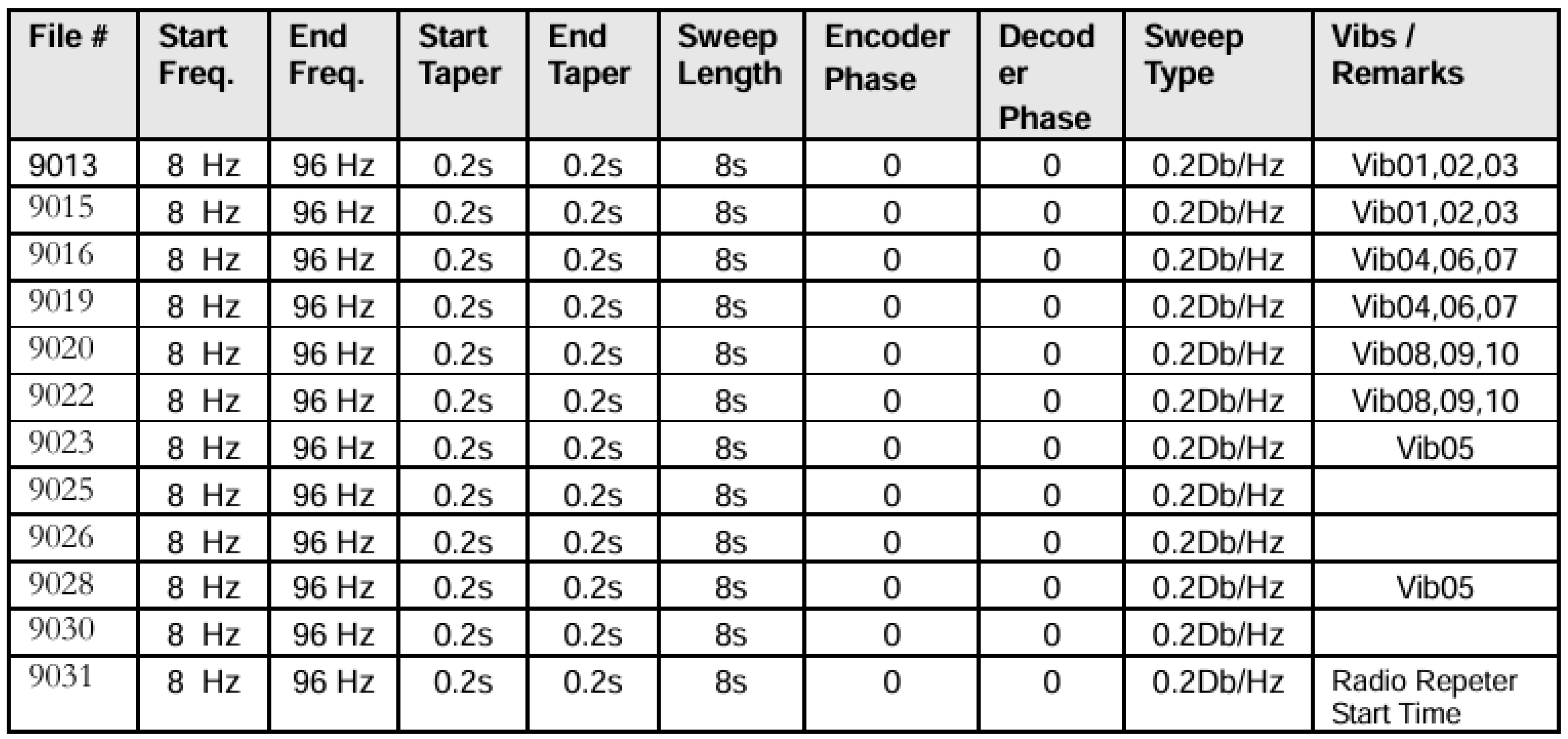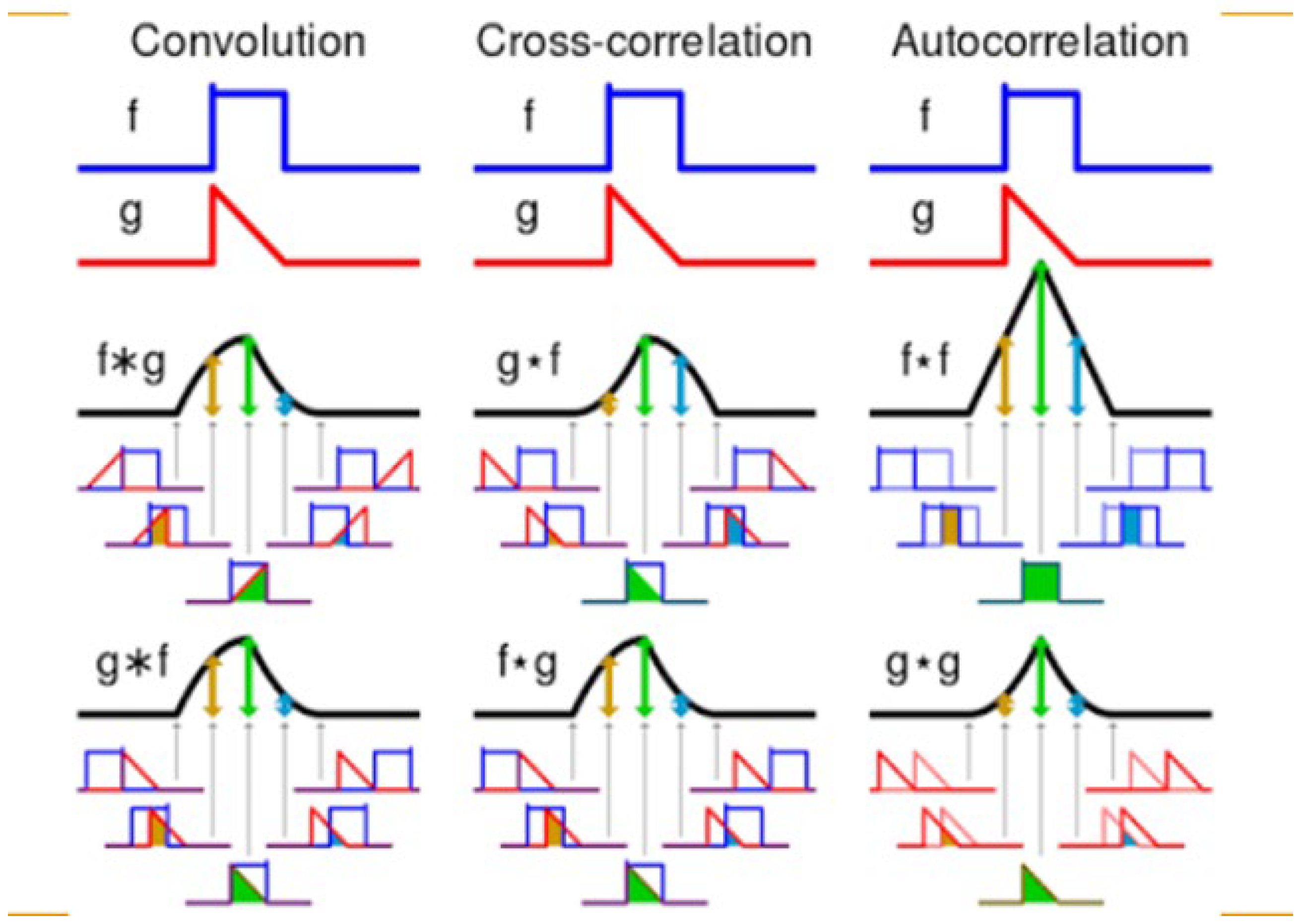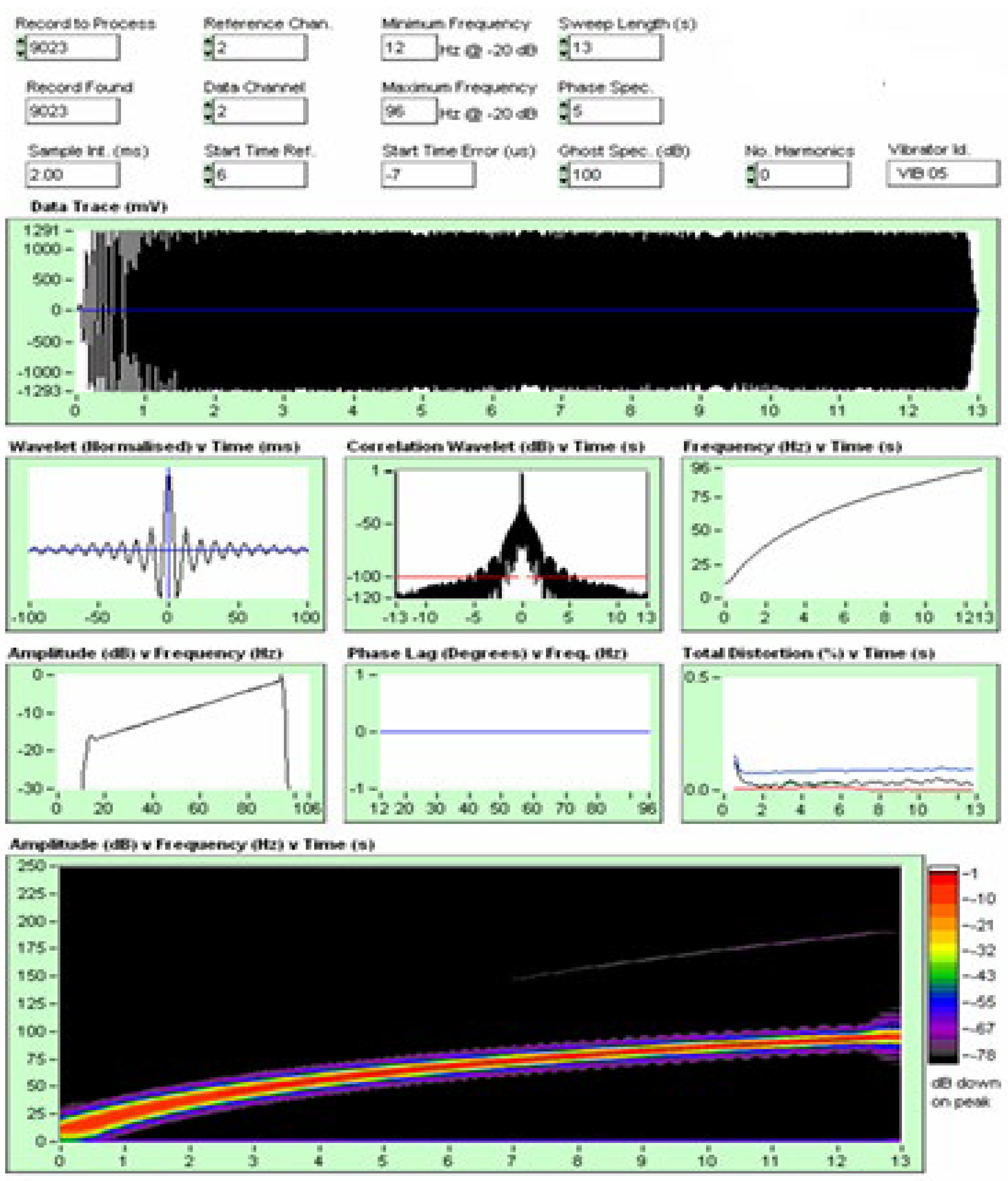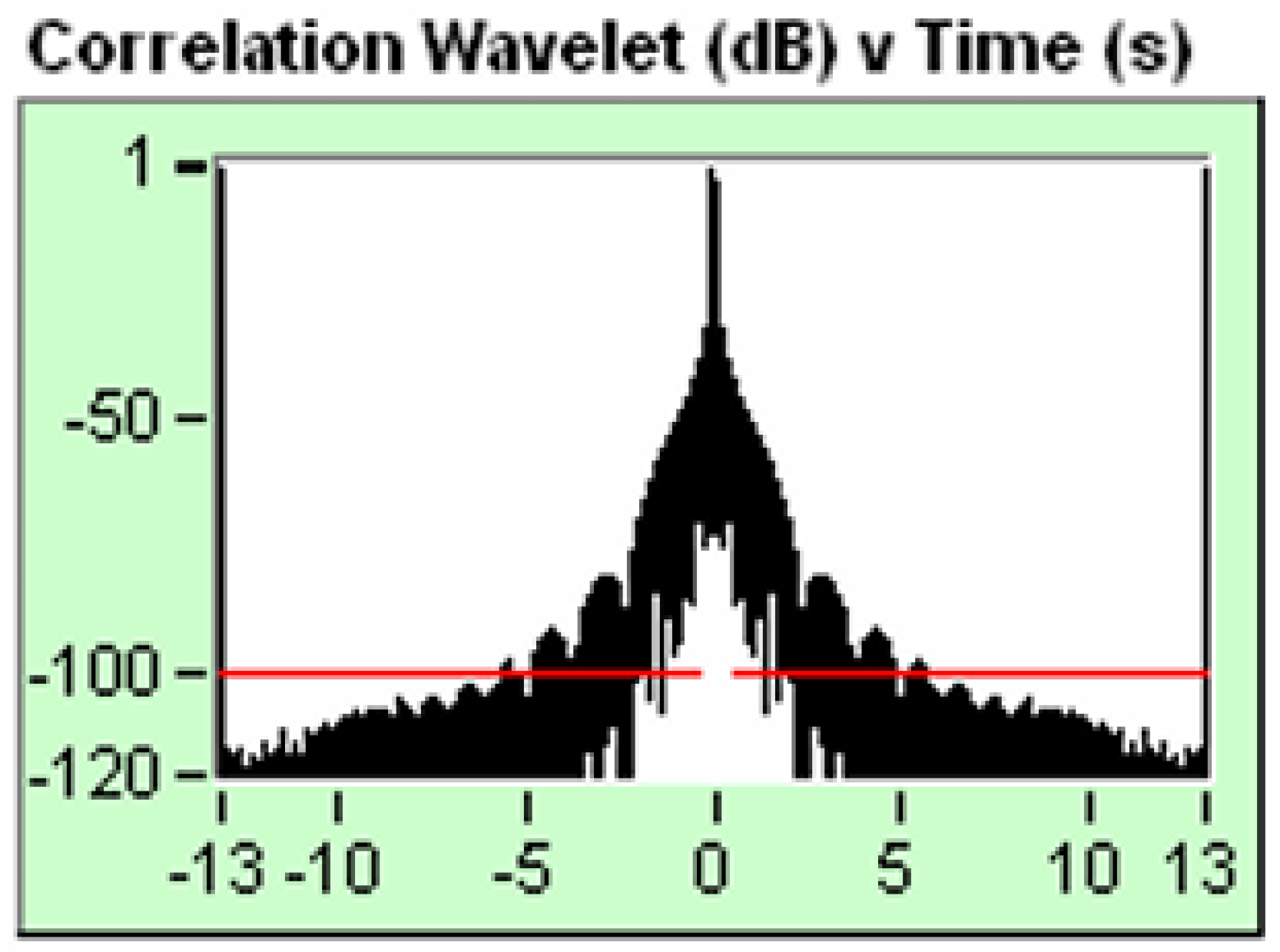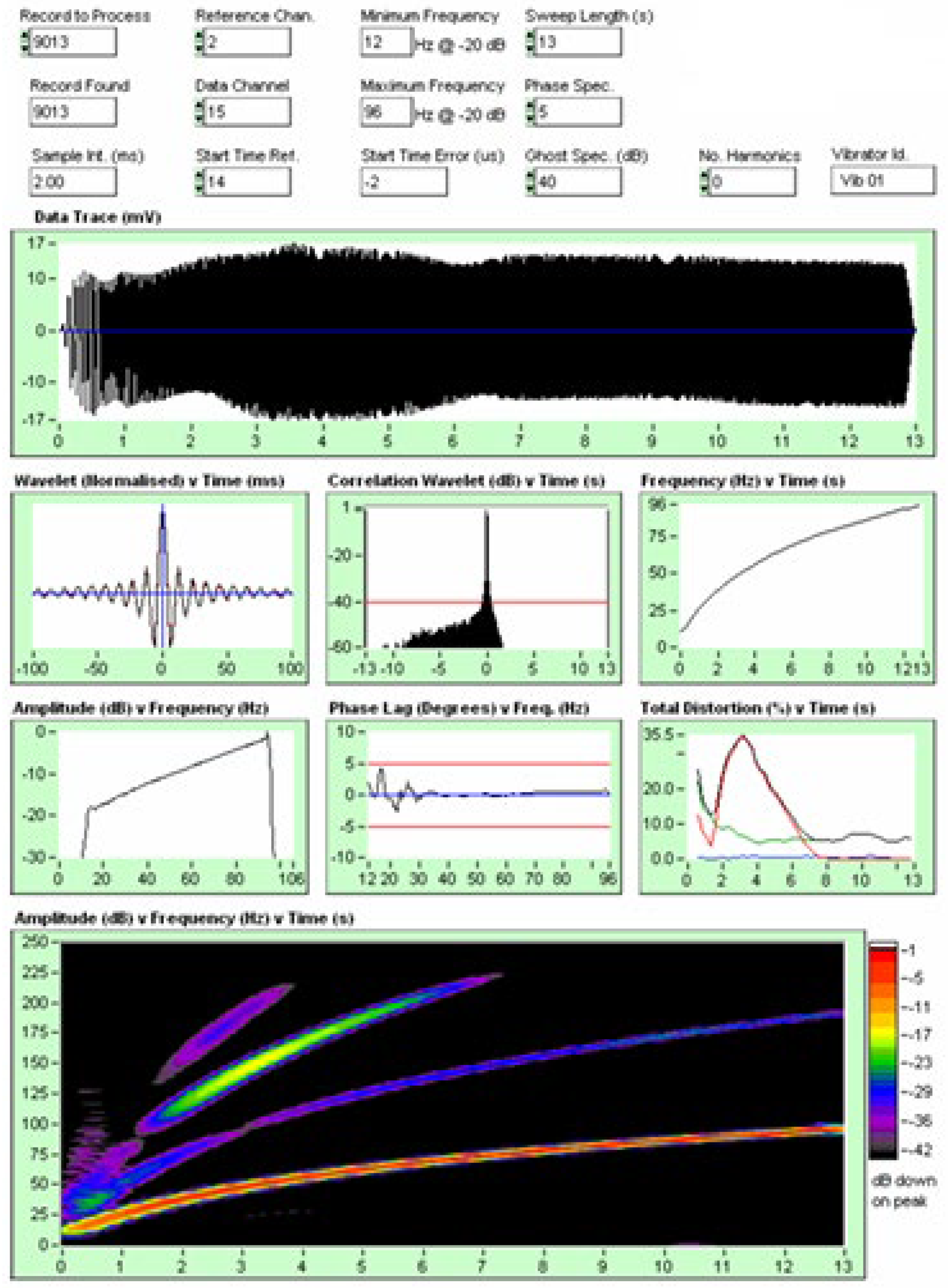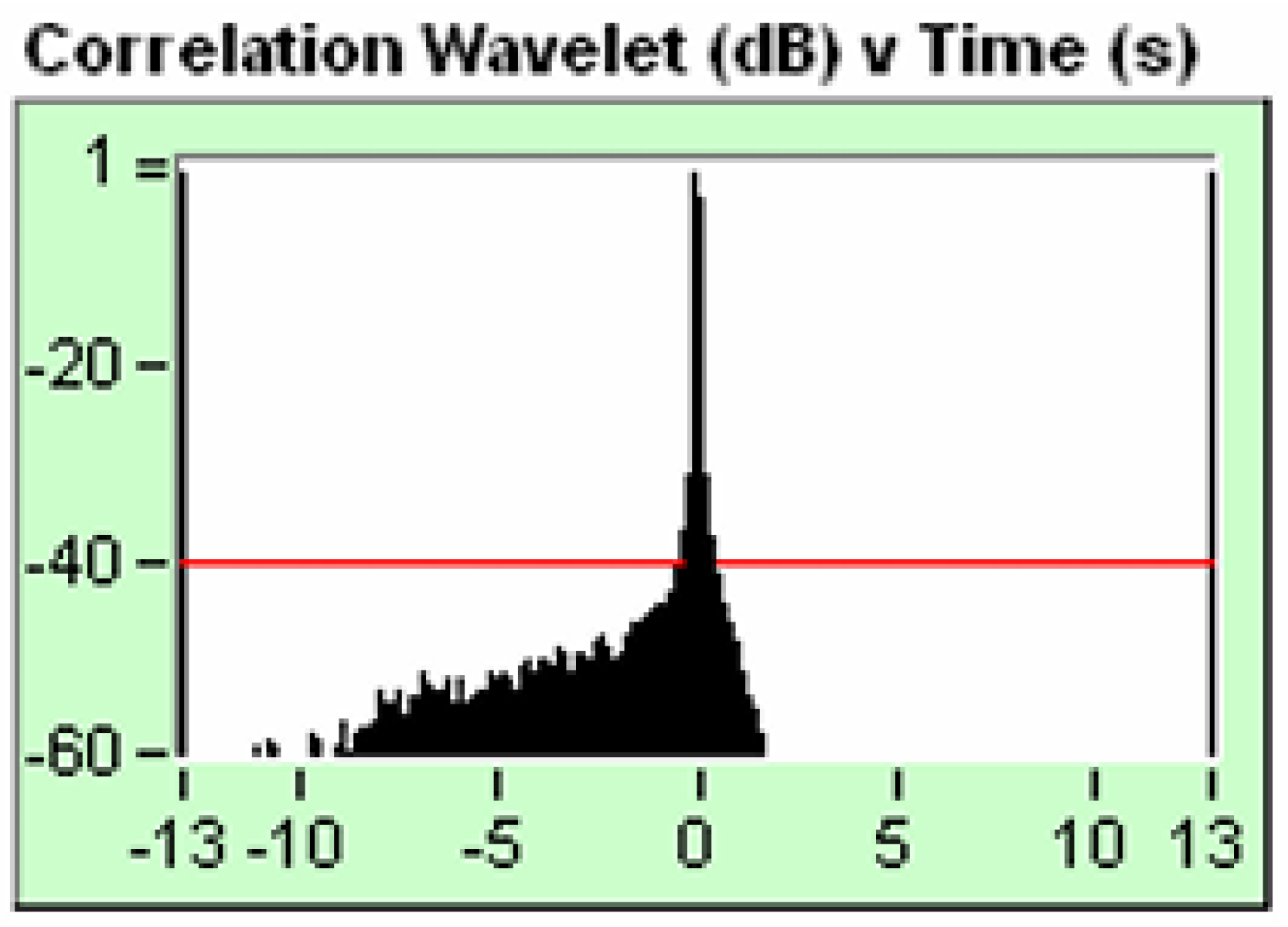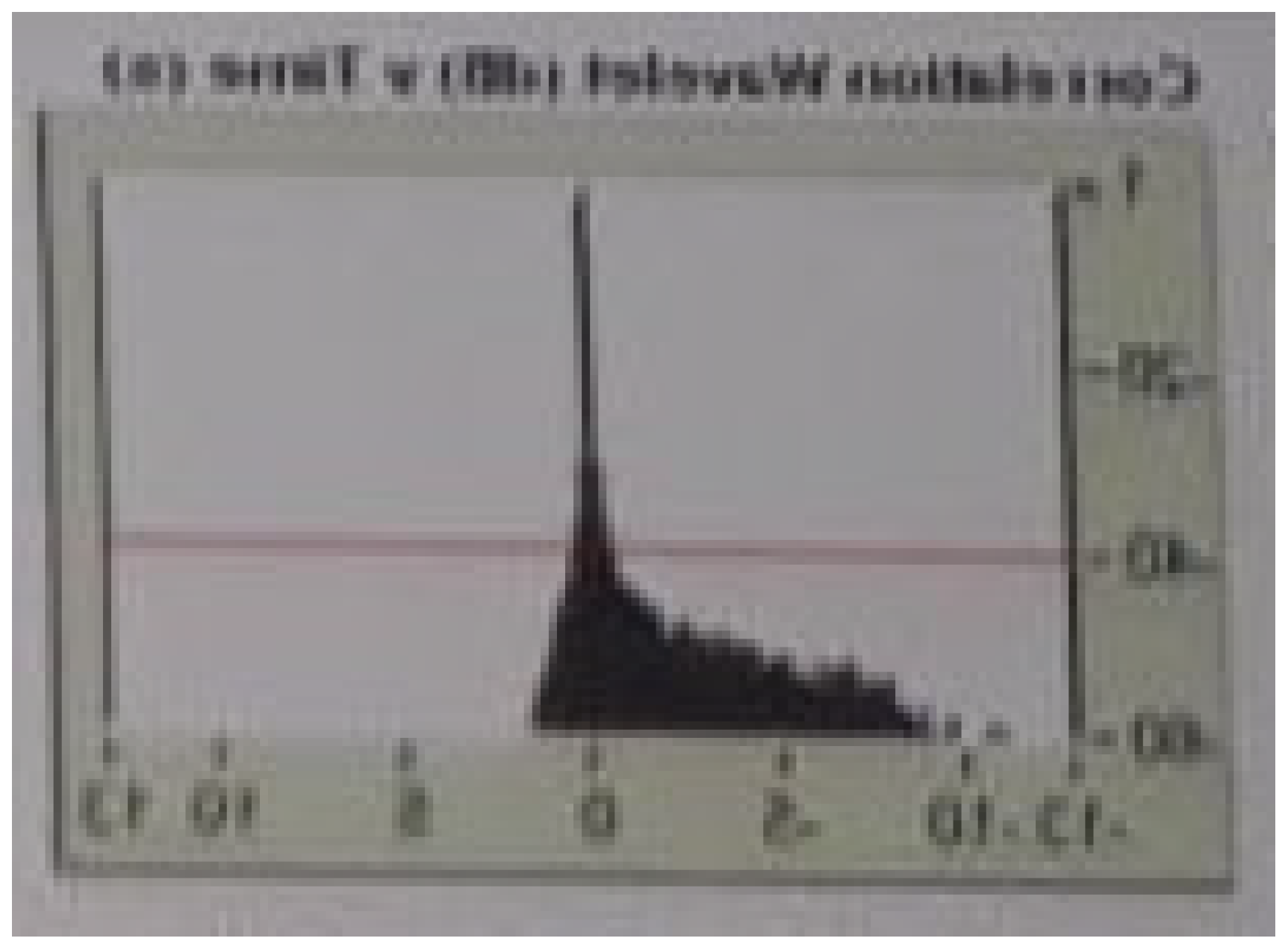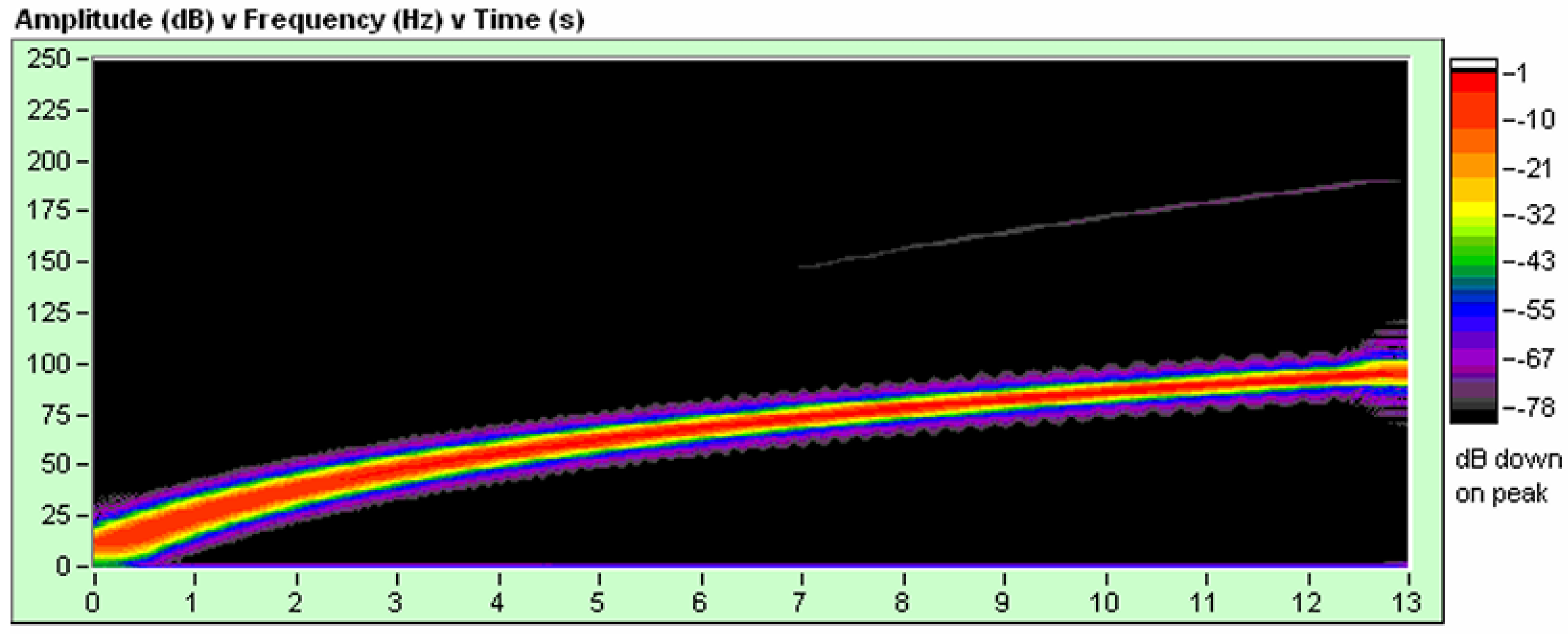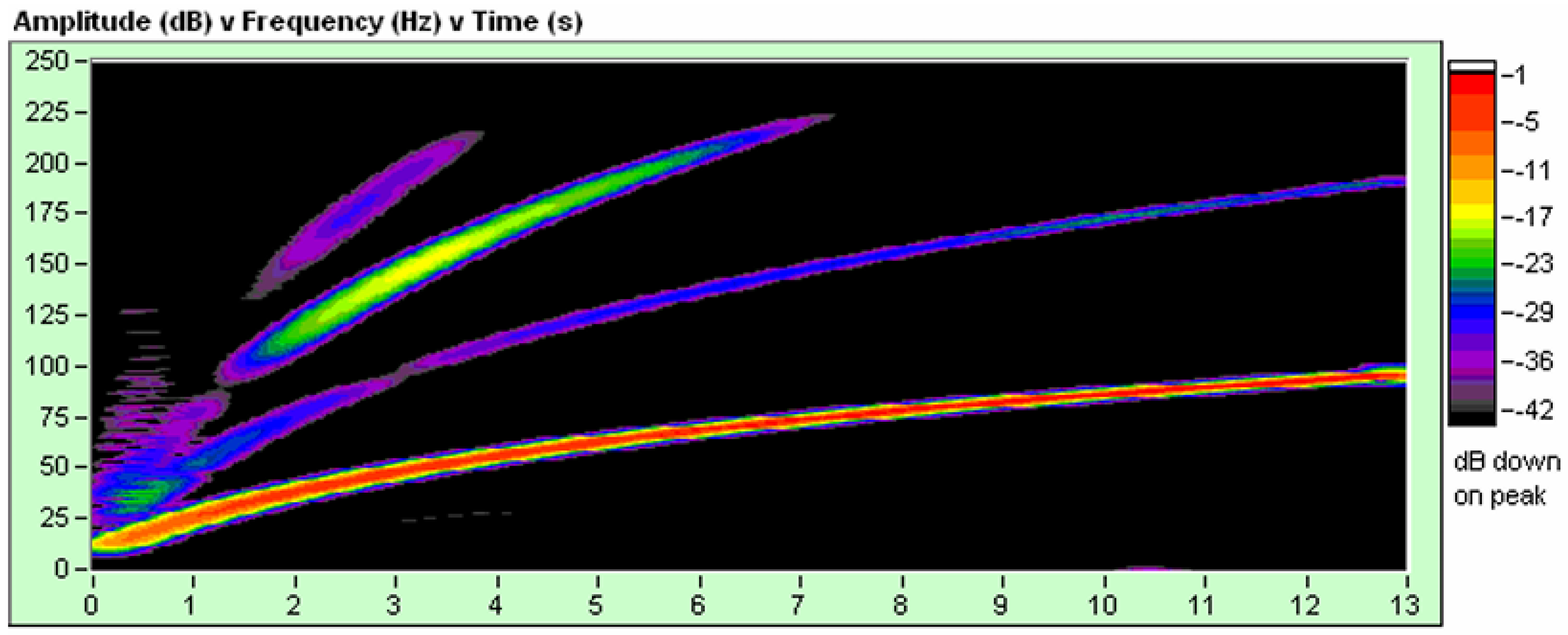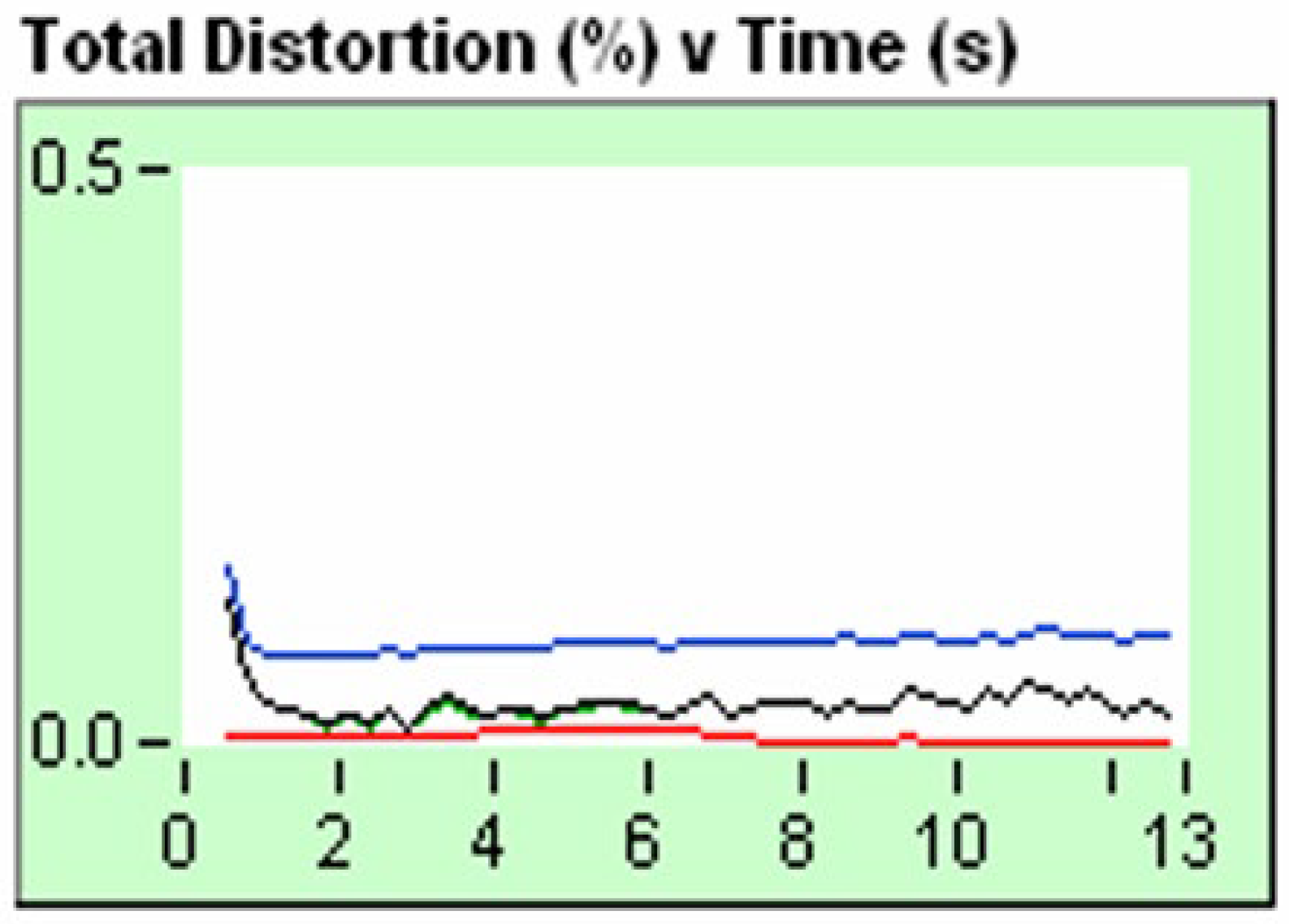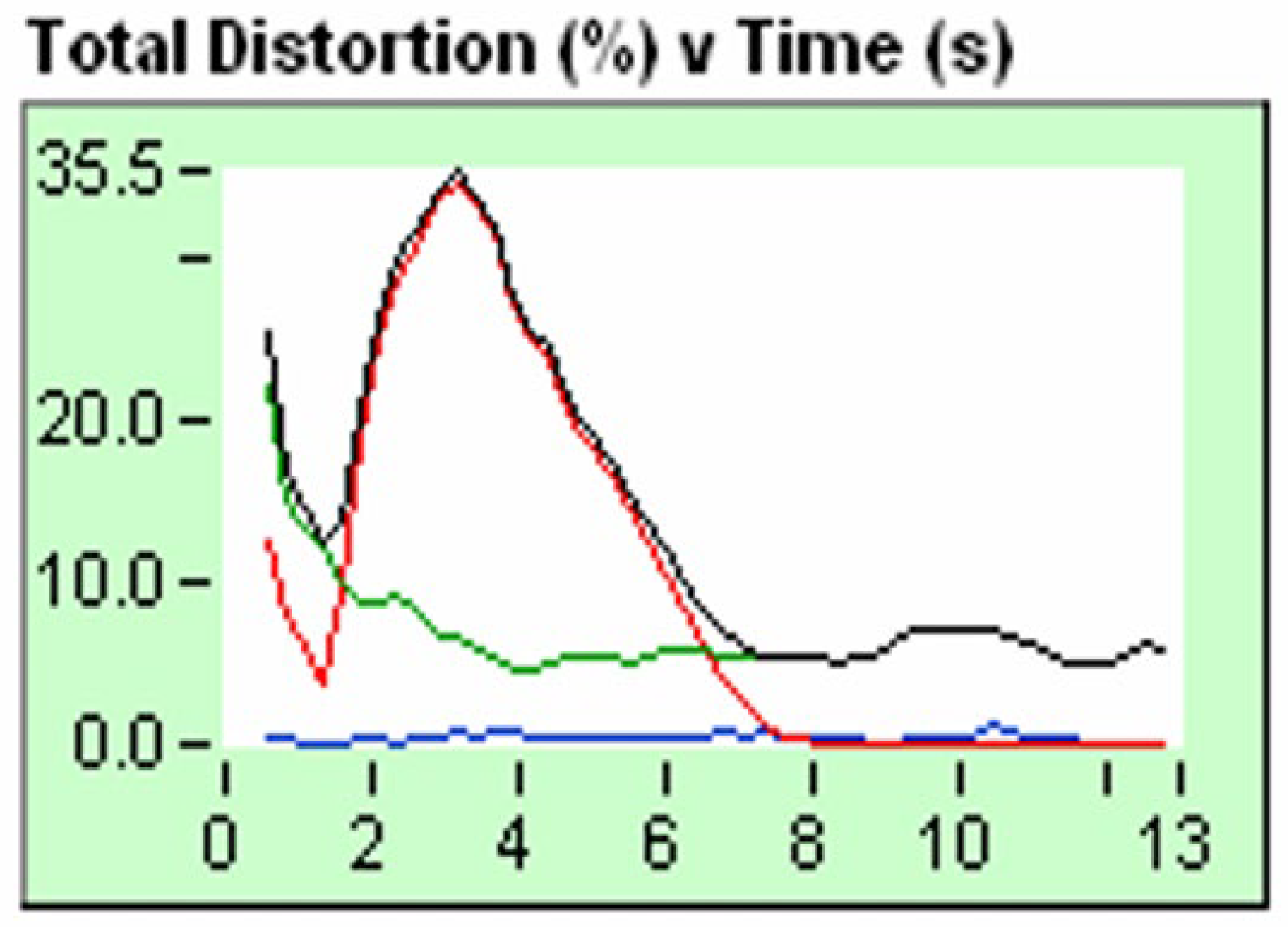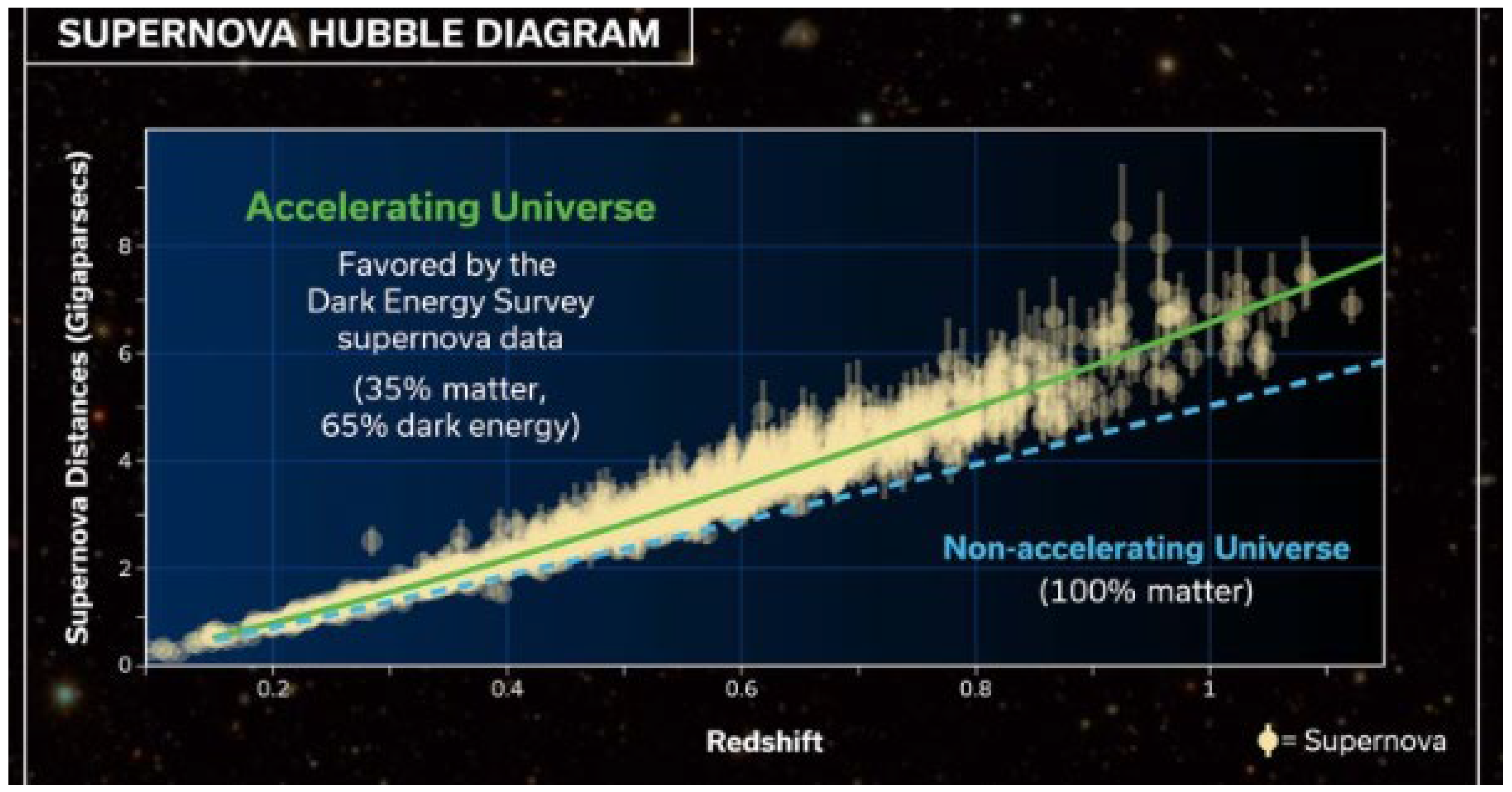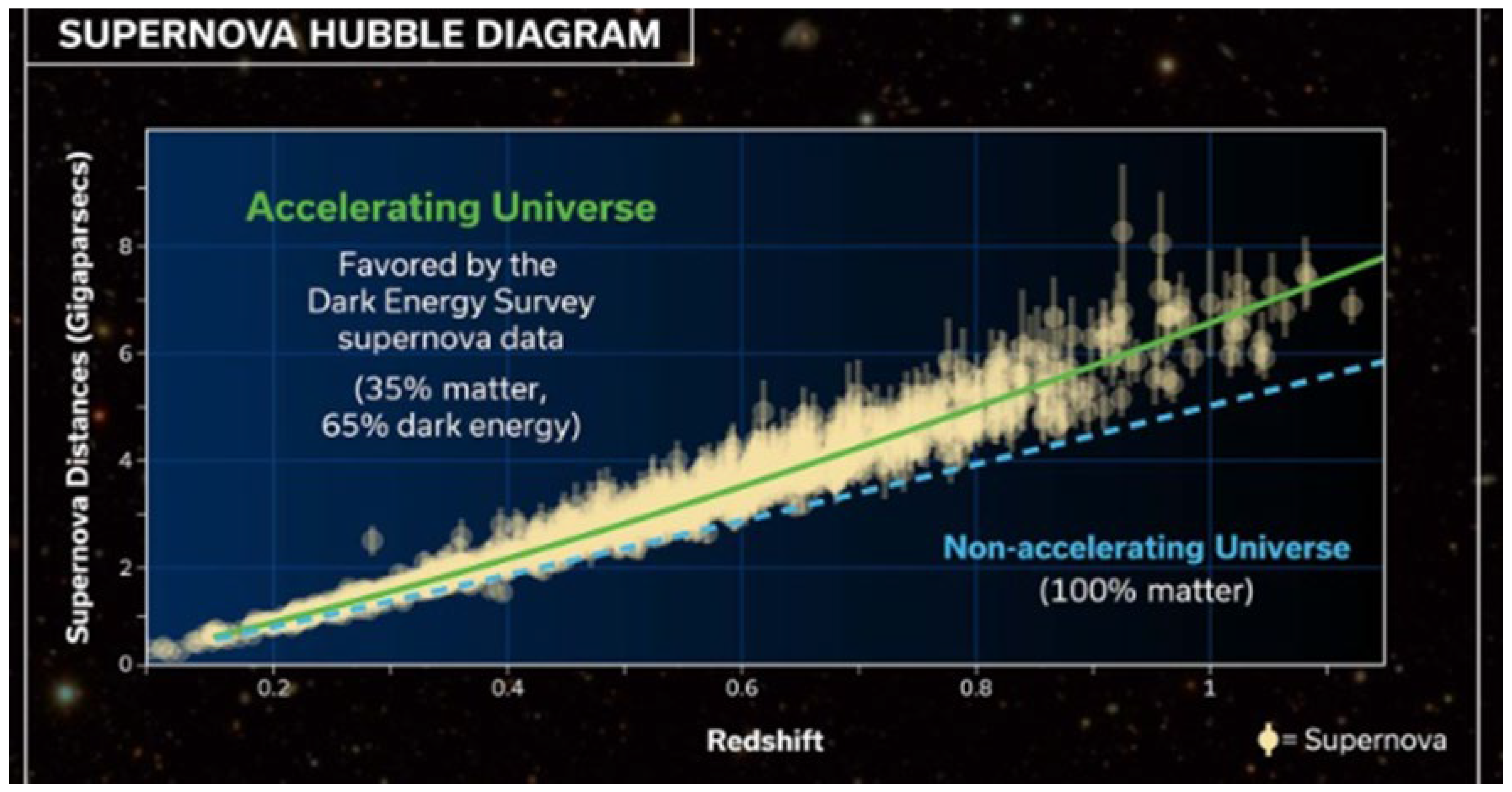2.1. Analysis of the propagation of seismic waves using the Vibroseis method and its analogy with the Big Bang.
Real example:
Figure 5.
Plot of seismic channels for file 9013.
Figure 5.
Plot of seismic channels for file 9013.
Figure 6.
Description of acquisition channels vs File.
Figure 6.
Description of acquisition channels vs File.
Figure 7.
-Description of the seismic sweep vs File.
Figure 7.
-Description of the seismic sweep vs File.
In our analysis, we are going to use a Hardwire Similarity, Start up.
The Hardwire Similarity is a test carried out in Seismic that uses Vibroseis, to measure the polarity of the Recording system and the polarity of the Vibroseis system as a whole; which must comply with the SEG (Geophysical Exploration Society) standards.
The Hardwire Similarity also serves to measure the start time or zero adjustment, that is, the synchronization of the system.
Figure 5, shows the graph of the signals recorded on tape, which we used to process the tests.
In
Figure 6, the signals are described per channel; the graph on the right describes what each signal is in the first 5 channels, from the graph in
Figure 5.
On the left, it is described what each signal is, from channel 6 to channel 17, from the graph in
Figure 5.
Figure 7, describes the sweep used in the test vs File. It tells us that its frequency ranges from 8 Hz to 96 Hz, that the sweep time is 8 s and that the sweep type used is 0.2 Db/Hz.
As a general comment, to process the signals we have used a Testif-i key.
Now, using graphs we are going to try to understand the mathematical process of correlation.
Figure 8.
Graphic explanation of the convolution, cross-correlation and autocorrelation process.
Figure 8.
Graphic explanation of the convolution, cross-correlation and autocorrelation process.
To begin our signal analysis, it is necessary to explain the following:
Vibroseis: It is a truck that consists of a servomechanism system that is divided into two parts; an electrical part, which generates the ideal electronic sweep. A mechanical part, which is responsible for transforming the electrical sweep into a mechanical sweep, which is applied to the ground. In our work we use 60,000 Lb Vibroseis.
Casa Blanca: It is the Recording truck, when the vibroseis executes the seismic sweep, this signal is transmitted to the different layers of the earth, is reflected in the different interfaces and returns to the surface, where it is captured by the geophones. This signal is transported from the geophones to recording truck, where it is processed (correlated) and recorded on tape.
Spread: It is the set of geophones, cables and boxes that are connected to the recording truck, which are distributed on the ground, used to capture the seismic signals emitted by the vibroseis.
Now we are going to analyze the following signals:
Figure 9.
Analysis of channel (2, 2), True Reference signal (see
Figure 5).
Figure 9.
Analysis of channel (2, 2), True Reference signal (see
Figure 5).
From the processing of this signal we are going to rescue the following image:
Figure 10.
- Envelope of autocorrelation canal (2,2).
Figure 10.
- Envelope of autocorrelation canal (2,2).
It is important to highlight that this signal is symmetrical on both sides, has no noise and reaches up to -120 dB common mode rejection of the signal/noise , It is a pure electronic signal.
Now we are going to analyze the following signal:
Figure 11.
Analysis of channel (2, 15), True Reference signal vs - Ground Force (see
Figure 5).
Figure 11.
Analysis of channel (2, 15), True Reference signal vs - Ground Force (see
Figure 5).
It is important to note that we are analyzing the signal from channel 2, true reference (it is a pure electronic signal) and the signal from channel 15, - ground force (It is the signal that the accelerometers of the Vibrosis truck capture, they are processed and sent to the recording truck, which are recorded on tape and displayed on the monitor, see
Figure 5).
From the processing of this signal we are going to rescue the following image:
Figure 12.
Envelope of cross-correlation canal (2,15).
Figure 12.
Envelope of cross-correlation canal (2,15).
Figure 13.
Envelope of cross-correlation canal (15,2), mirror image.
Figure 13.
Envelope of cross-correlation canal (15,2), mirror image.
Let's first analyze image 12 and 13.
If we analyze
Figure 8, we see that it is not the same to cross correlate the channels (2, 15) or cross-correlate the channels (15, 2), from now on
, we are going to use Figure 13, the envelope of cross correlation of the channels (15, 2) for the simple reason that in this picture the noise corresponds to the right of zero, that is, for positive time, this is the main reason why we use this envelope of cross-correlation configuration. In Figure 12, the signal/noise is to the left of zero, for negative times and that confuses our interpretation.
The correct thing would be to use the Testif-i key to process the signal again, perform the envelope of cross-correlation of the signals (15, 2) and obtain the correct image, unfortunately I do not have that Testif-i key; for which I am forced to use the mirror image and give a good explanation.
Now we are going to analyze how everything explained is related to the Big Bang.
If we analyze
Figure 10, it shows the autocorrelation envelope of the signal that corresponds to channel 2 (True Reference, pure electronic signal), it is a symmetrical signal and reaches up to -120 db common mode rejection of the Signal/noise, It has no noise and we can see this in the FK filter that we show below.
Figure 14.
Shows the frequency content, FK filter of the channel 2 signal (True Reference).
Figure 14.
Shows the frequency content, FK filter of the channel 2 signal (True Reference).
Figure 14, shows the frequency content of the electronic sweep of channel 2 (True Reference), we see that it does not have even or odd harmonics and we do not see noise in the signal, in other words it is a pure, perfect electronic sweep.
This pure electronic signal that corresponds to channel 2 (True Reference) is the perfect analogy with the Big Bang. The theory developed to explain the Big Bang, the Lambda-CDM model (metrica FLRW), analyzes the Big Bang as if the expansion were of a single fundamental frequency, this makes us think that the expansion should have a single Hubble constant. This expansion does not consider even and odd harmonic frequencies or noise in the signal, which is very important because these additional energy contributions make the Hubble´s constant variable and most importantly, the additional energy makes the expansion of the universe accelerate.
If we analyze figure 13, it shows the envelope of the autocorrelation of the signal that corresponds to the channel (15, 2) that corresponds to the signal -Ground Force vs True Reference, it is an antisymmetric signal and we observe that from - 40 db common mode rejection of the signal/noise, there is a noise content and we can see this in the FK filter shown below.
Figure 15.
- Shows the frequency content, FK filter of the channel 15, signal (-Ground Force).
Figure 15.
- Shows the frequency content, FK filter of the channel 15, signal (-Ground Force).
If we make an analogy with the Big Bang, in addition to the fundamental frequency, we must consider the harmonics and inherent noise to be able to correctly interpret the expansion of the universe.
Now we are going to analyze it from another point of view, to understand the origin of dark energy.
Let's analyze the distortion graph, from figure 9, we rescue the following graph :
Figure 16.
Total distortion % vs Time (s).
Figure 16.
Total distortion % vs Time (s).
Remember that figure 9 represents a pure sweep signal without distortion. If we look at
Figure 16, we see that the distortion is approximately of the order of 0.1%. We can also see this in figure 14, FK filter, in which it is observed that there is no dostortion.
If we make an analogy with the Big Bang, the expansion of space-time, we can consider the example of the balloon that inflates, it does so with a fundamental frequency, there is no distortion, noise, it is an ideal expansion that follows the FRWL metric, the equations of general relativity and all the theoretical development framed in the theory of modern Cosmology.
Let's analyze the distortion graph, from figure 11, we rescue the following graph :
Figure 17.
Total distortion % vs Time (s).
Figure 17.
Total distortion % vs Time (s).
In figure 17, we are analyzing the distortion graph of a real signal, it is a signal emitted by the vibroseis truck that interacts with the terrain. We see that the distortion peak is approximately 35%. That distortion is produced by even harmonics, odd harmonics and additional noise. We can also see this in figure 15, FK filter, in which the frequencies of even, odd harmonics and additional noise are observed.
Again, if we make an analogy with the Big Bang, it is important to understand the following concept. The expansion of space-time produced by the Big Bang, in addition to producing a frequency spectrum of gravitational waves, produces an additional spectrum of even and odd harmonics, additional noise that is the result of the convolution of the gravitational wave spectrum produced by the Big Bang with space-time being the medium through which gravitational waves propagate.
The sum of additional energy due to the frequency of even and odd harmonics and additional noise is dark energy. Since this energy distribution is not constant as a function of time, it generates what we call Hubble´s tension, which is nothing more than considering the Hubble´s constant variable.
In general, when the vibroseis truck carries out the sweep, depending on the type of terrain, a distortion of the order of 20% to 50% is produced, when the terrain is volcanic rock the distortion goes up to 80%, also on occasions the distortion exceeds 100% producing a decoupling of the vibroseis truck from the ground, in this situation the force exerted by the earth on the vibroseis truck is greater than the weight of the vibroseis, causing it to make sudden jumps.
Recall that we have hypothesized that the Big Bang behaves as a minimal phase causal system, in other words, the energy contribution is a function of time.
This is how we can correctly understand the following graph:
Figure 18.
Supernova Hubble Diagram.
Figure 18.
Supernova Hubble Diagram.
The difference that exists between the dotted light blue line, which corresponds to the non-accelerated universe, and the green line, which corresponds to the accelerated universe, is simply that we are not considering the energy contributions that correspond to the harmonics of the fundamental frequency and the noise inherent, as was analyzed for the example of Hardwire Similarity that is carried out in seismic prospecting. If we consider the contributions of additional energies to the fundamental frequency (harmonics of the fundamental frequency and the noise inherent) as a function of time, we will understand why the expansion of the universe is accelerated and deduce that the Hubble´s constant must be variable.
In
Figure 13, we can see that additional energy contribution corresponding to the harmonics and noise in the signal, we can see how from time t = 1 to t = 13 sec; The additional energy decreases from -40 dB to -60 dB common mode rejection of the signal/noise. In
Figure 10, which corresponds to a pure electronic signal, we can see that this additional energy does not exist precisely because the signal does not have harmonics and noise. In this case, if we observe for t = 13 s, we see that the signal takes the value of - 120 Db common mode rejection of the signal/noise
Continuing with the analogies of our example, just as we consider that the area in which the seismic survey is carried out exists, it is the physical space which we are going to study to find out if there is gas or oil, this leads us to an important conclusion; when the Big Bang occurred, space-time already existed, in this case we could consider a local big bang in an infinite space-time full of big bang or multiverses.
